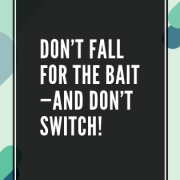Who Are You Bringing to Your Job Interview?
Interviews
I’m on fire about job interviews. I’ve recently had an epiphany about how we approach interviews that I should probably share with you. Maybe it will help change the way you approach your next job interview – and help you land that job.
If I had a dollar for every time I’ve had a client tell me “If I can just get the interview, I know I can get the job,” I’d have a lot of dollars. Seriously, it’s one of the most common things my interviewing clients will tell me.
But the very worst interview advice many career professionals give is to focus on the preparation. But this is the bulk of the advice out there — make sure you research the company, find out who you’re interviewing with and be sure to have questions to ask at the end of the interview.
Some career professionals even suggest you prepare answers to commonly-asked interview questions. Sometimes we’ll tack on the end of the advice, as more of an afterthought than anything, “just show up and be yourself.”
But the very worst interview advice many career professionals give is to focus on the preparation.
But really, that’s contradictory to “be prepared” advice isn’t it? Because what smart people do is use the information they gather during the preparation phase to mold and shape how they’re going to approach the interview. They use the preparation information to help them figure out how to best sell themselves during the interview.
And this is where the advice goes horribly wrong. It’s hard to balance “just showing up” with “selling yourself.”
Here’s what happened to a recent client, James. James has been looking for full-time work for about three years. He’s had fairly regular consulting work, but he’d really like to land somewhere full-time. And he came to me after he landed an interview at one of his target companies.
Luckily for me, James has bombed a few interviews. Why does this make me lucky? Well, candidates who have gone through the interview process without landing a job tend to be self-reflective. In their smart, savvy minds, they’ve reviewed each interview detail in excruciating detail picking apart their answers, what they said/didn’t say and what they would do differently next time.
Do I need to mention that they tend to be really, really hard on themselves too? Self-reflective is great. Beating yourself up is not, so please stop. Right now.
Up front, James shared with me that he felt “prepared” (there’s that word again) for each interview. He had done his homework both about the company he was interviewing with and about his relevant accomplishments and experience. He knew what points he wanted to make and he’d complied a few examples to share. So what went wrong?
In his opinion, he really didn’t sell himself during the interview. He didn’t communicate his unique blend of education and experience. He didn’t let his “real personality” come through. Bingo! I knew we had tapped into something with this.
So I asked for more information. James shared that he gets nervous during interviews, so he tends to try and control the interview. He focuses more on giving “strategic answers” rather than answers that really reflect his best skills and experience.
He didn’t let his “real personality” come through.
For example, he didn’t have the 5-7 years experience the employer was looking for. Why? Because since graduating he’s been doing consulting work. He’s found project after project to work on (no small feat, really) and he’s done interesting and valuable work. Just not as an employee.
In his answer, there was an apologetic tone that he didn’t have the 5-7 years experience – totally overlooking the fact that he’d done something pretty amazing – had a regular stream of work with lots of exposure to different environments, organizations and people. His industry was especially affected during the recession which makes this even more amazing – I know some of his peers that haven’t been able to do any work related to their profession.
So what James did was what many interviewees do – they throw their personal brand out the window during the interview process. James wasn’t showing up as James – he was showing up as Jim, Jimmy or Jamie, depending on what he thought the employer wanted.
He focused on preparing and performance, rather than on showing up and letting his brand shine through. He neglected to appreciate all the hard work he’s done by looking as his career as a total package – not just focusing on how he compared to the “ideal” candidate.
So what happened with James? The first interview went well. He felt more confident about how he talked about his unique brand even though he’s not the most qualified (just acknowledging that he wasn’t as qualified was super-liberating, he said.)
He found out during the interview that his versatility is really appealing to them. And he’s been invited back for another round of interviews. Now that James is showing up as James, I have a feeling things are going to work out well.
Brand YOU! Boot Camp
Discover your unique brand to help you land your perfect job, launch a career reinvention or take your career to the next level. Learn more about the next session starting soon and sign up here.
 I’m Stacey Lane: Confidence Builder. Networking Smarts. Resume Wordsmith. Personal Branding Strategist. Career Coach. I help individuals with unique backgrounds find their perfect fit and effectively market themselves so they find work that is as interesting as they are.
I’m Stacey Lane: Confidence Builder. Networking Smarts. Resume Wordsmith. Personal Branding Strategist. Career Coach. I help individuals with unique backgrounds find their perfect fit and effectively market themselves so they find work that is as interesting as they are.




